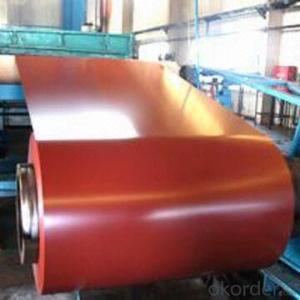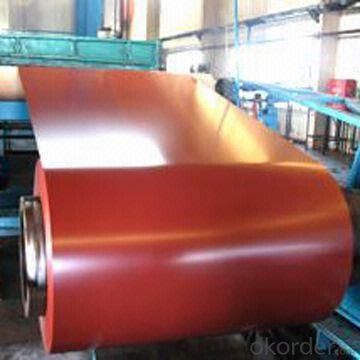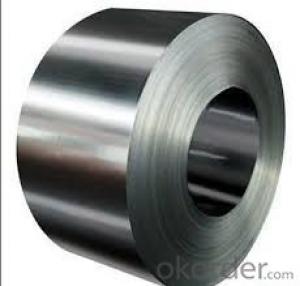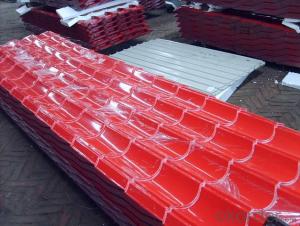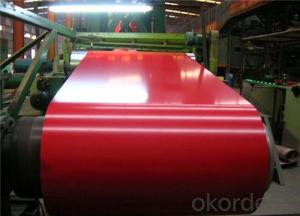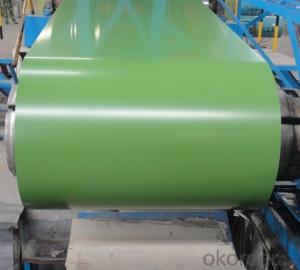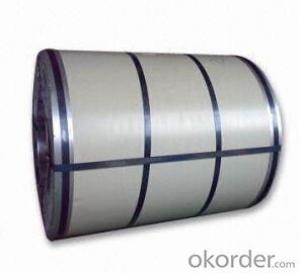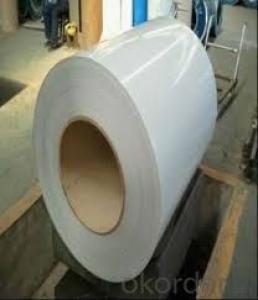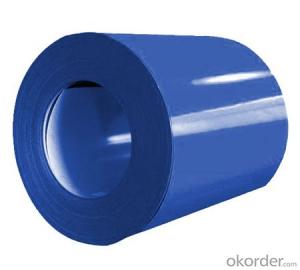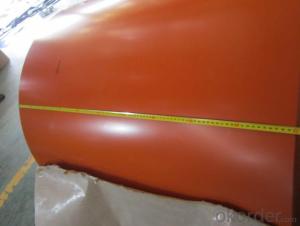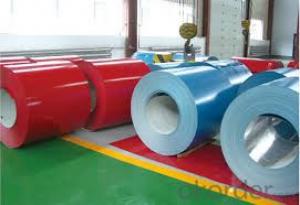Pre-painted Steel Coil PGL ASTM,DX51D,ASTM A 653,DX51D+Z
- Loading Port:
- Shanghai
- Payment Terms:
- TT OR LC
- Min Order Qty:
- 50 m.t.
- Supply Capability:
- 100000 m.t./month
OKorder Service Pledge
OKorder Financial Service
You Might Also Like
1.PPGL /PPGI Steel information
Standard | ASTM A653, JIS G3302,GB/T3830-2006 |
Grade | DX51D,SGCC,SPCC,SGHC |
Thickness | 0.18mm--1.5mm |
Width | 400-1250mm(usual size:914mm,1000mm,1200mm,1219mm,1250mm,) |
Base metal | Galvanized steel coils,Galvaume steel coils |
Zinc coating | Z40-Z275 AZ20-AZ150 |
Coil ID | 508mm,610mm |
Coating thickness | Top:17-25um back:5-8um |
Color options | Ral number or as per your request |
Packing | Standard seaworthy export packing: 3 layers of packing, inside is kraft paper, water plastic film is in the middle and outside GI steel sheet to be covered by steel strips with lock, with inner coil sleeve. |
Delivery | Within 10-15days after signing contract |
Price | FOB&CNF&CIF price |
Payment terms | TT or L/C |
Monthly supply | 30000MT per month |
Application: | workshop, storeroom, roofing,kiosk... |
- Q: How are steel coils inspected for uniformity using statistical analysis?
- Various techniques and procedures can be employed to inspect steel coils for uniformity using statistical analysis. The primary goal is to guarantee that the coils meet the required specifications and exhibit consistent quality throughout. One prevalent inspection method involves obtaining a representative sample of steel coils from a batch or production run. These coils are selected randomly to ensure a fair representation of the entire batch. Statistical analysis is then conducted on this sample to assess the uniformity of the coils. The initial step entails measuring various physical properties of the coils, such as thickness, width, weight, and surface defects. These measurements are recorded for each coil in the sample. The collected data is subsequently subjected to statistical analysis, encompassing mean, standard deviation, and range calculations. By calculating the mean values of the measured properties, one can determine the average values for thickness, width, weight, etc. These mean values can be compared to the desired specifications to identify any deviations or inconsistencies. The standard deviation serves as an indicator of the variability or dispersion of the data, revealing the degree to which the coils adhere to the desired specifications. A smaller standard deviation denotes greater uniformity. Furthermore, range calculations can be executed to ascertain the difference between the maximum and minimum values of the measured properties within the sample. A smaller range implies a higher level of uniformity. Statistical analysis can also incorporate the use of control charts, such as X-bar and R-charts, to visually track the variation in the measured properties over time. These charts offer a graphical representation of the data, facilitating the identification of any trends or out-of-control conditions. In summary, statistical analysis provides a systematic approach to evaluating the uniformity of steel coils by providing objective measurements and statistical indicators. By analyzing the collected data, manufacturers can detect any deviations from the desired specifications and implement appropriate corrective measures to ensure consistent quality throughout the production process.
- Q: How are steel coils used in the manufacturing of agricultural structures?
- Steel coils are a vital component in the manufacturing of agricultural structures due to their durability, strength, and versatility. These coils, which are typically made from high-quality steel, are used in various ways throughout the process of constructing agricultural structures such as barns, silos, and storage buildings. One of the primary uses of steel coils in agricultural structures is in the fabrication of the building's framework. The coils are unwound and cut into specific lengths, which are then bent, shaped, and welded together to form the structural framework of the building. The strength and rigidity of steel coils make them an ideal choice for withstanding the heavy loads and harsh environmental conditions commonly found in agricultural settings. Additionally, steel coils are also used to manufacture various components and accessories for agricultural structures. These coils can be transformed into panels, roofing sheets, doors, and windows, which are essential elements in the construction of agricultural buildings. The ability to customize the shape, size, and thickness of the steel coils allows for flexibility in design and ensures that the finished structure meets the specific requirements of the agricultural application. Furthermore, steel coils play a crucial role in providing protection and safety within agricultural structures. They are used to fabricate fencing and gates, providing a secure boundary around the premises and preventing unauthorized access. Steel coils can also be used to reinforce the walls and floors of the building, enhancing its overall stability and durability. Moreover, steel coils offer excellent resistance to corrosion, which is particularly important in agricultural structures due to the exposure to moisture, chemicals, and other corrosive elements. Their durability ensures that the structure remains intact and functional for an extended period, reducing maintenance and replacement costs. In conclusion, steel coils are an essential component in the manufacturing of agricultural structures. Their strength, durability, versatility, and resistance to corrosion make them an ideal choice for constructing the framework, components, and accessories of these buildings. By utilizing steel coils in the manufacturing process, agricultural structures can be built to withstand heavy loads, harsh environmental conditions, and provide long-lasting protection for agricultural operations.
- Q: That's my question, well that and:Steel Pick + Electric Guitar = Trashed Guitar?:D
- Uh. . . your guitar would be okay. . . except your strings wouldn't last long then nylon strings.
- Q: Where can I find a discount online for Stainless Steel Magnetic Knife Rack
- Hi okorder /
- Q: what does steel have inside of it that makes it rust.I need the answer fast!!!!!!!!!
- Steel is made by refining iron. Iron is mined as a red powdery ore. Unfortunately, when moisture and oxygen are present, the steel attempts to revert to its original state.
- Q: Can steel coils be coated with UV-resistant materials?
- Yes, steel coils can be coated with UV-resistant materials.
- Q: Why?Which one should i get? I am just starting to learn Guitar. Which one would be better for me? What is the difference? I already got the acoustic nylon but i might return it... if the steel is better.
- I find for beginners nylon is better. You won't get as many blisters and nylon strings are easier to bend. Check out my website for some free lessons and free bonus info for the exact answer you are looking for
- Q: This question gets beat to death from what ive seen online but im going to ask it since im searching for a few new knives. The question is as the titles states what is the best steel for a general purpose knife? I plan on buying several different types of knives, Folders, fixed blades, ect. I will carry them around with me all the time for basically anything i can think of to use it for. The reason i ask this question here is because looking online everyone has a differnt veiw. Some say stainless is too soft while others say carbon will chip and is more brittle. Even looking at just a single type of steel, carbon fort instance everyone has a different opinion as to whats best leaving me kind of lost for what i should get. Maybe the better word would be What is a good general purpose steel?. Any advice is much appreciated!!!!
- There is no right one answer, because the term all purpose knife covers a very broad spectrum. The same knife that would be good for wood carving will not be the same for food prep, and will not be the same for general utility purposes. I'll just give you my humble opinion. For fixed blade, hard use blades. Where you will be doing bush tasks like chopping, carving etc... 1095 carbon is generally the standard. Now, 1095 is a great steel, it isn't the BEST steel. There are other steels that can outperform it. But for the price and availability its hard to beat. For folders, I prefer a decent stainless, like aus 8. It holds a good edge, and will hold up to any tasks you need a folding knife to do. Contrary to what you will read on the internet, stainless steel is not all crap. Its just that cheap stainless is just that, cheap. Stainless steel is only as good as its tempering process, some companies such as boker do amazing things with the steel and make for an impressive blade. Just stay away from crap stainless. So to sum up. 1095 for fixed blades. aus 8 for folders. These are both common steels used by different companies. If you get caught up on finding the perfect steel, you may overlook more important aspects of the knife itself. Unless your fixed blade is mostly going to be a food processing, and skinning knife, then I would suggest a QUALITY stainless as well. Remember that all high carbon blades need to be kept oiled or they will start to rust very fast. Btw, I suggest anyone looking into knives to check out mora fixed blades. Incredibly cheap, sharp and durable. They are the rockstars of bushcraft.
- Q: Can steel coils be coated with noise-reducing materials?
- Yes, steel coils can be coated with noise-reducing materials. Coating the coils with noise-reducing materials helps to minimize noise levels and vibrations, making them suitable for various applications where noise control is important, such as in automotive, construction, and manufacturing industries.
- Q: How are steel coils used in the production of fireproof doors?
- Steel coils are used in the production of fireproof doors as they are the primary material for constructing the door's core. The steel coils are shaped and layered to create a strong and heat-resistant core, which provides the necessary structural integrity and fire resistance required for fireproof doors.
Send your message to us
Pre-painted Steel Coil PGL ASTM,DX51D,ASTM A 653,DX51D+Z
- Loading Port:
- Shanghai
- Payment Terms:
- TT OR LC
- Min Order Qty:
- 50 m.t.
- Supply Capability:
- 100000 m.t./month
OKorder Service Pledge
OKorder Financial Service
Similar products
Hot products
Hot Searches
Related keywords
